if条件状语从句_语法
- 格式:ppt
- 大小:1.95 MB
- 文档页数:36
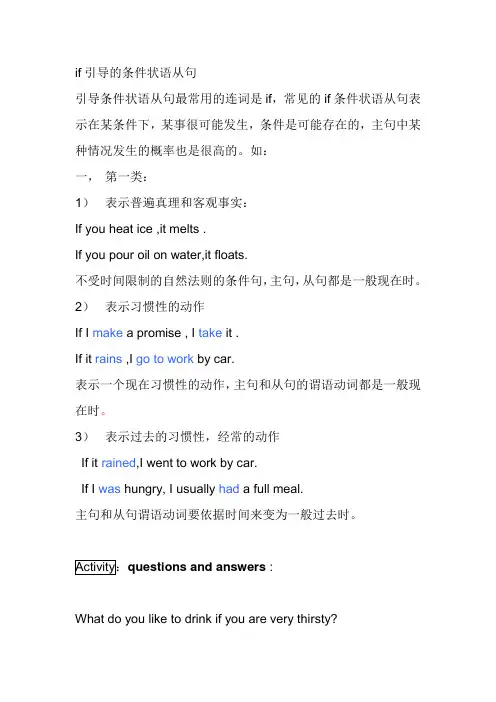
if引导的条件状语从句引导条件状语从句最常用的连词是if,常见的if条件状语从句表示在某条件下,某事很可能发生,条件是可能存在的,主句中某种情况发生的概率也是很高的。
如:一,第一类:1)表示普遍真理和客观事实:If you heat ice ,it melts .If you pour oil on water,it floats.不受时间限制的自然法则的条件句,主句,从句都是一般现在时。
2)表示习惯性的动作If I make a promise , I take it .If it rains ,I go to work by car.表示一个现在习惯性的动作,主句和从句的谓语动词都是一般现在时。
3)表示过去的习惯性,经常的动作If it rained,I went to work by car.If I was hungry, I usually had a full meal.主句和从句谓语动词要依据时间来变为一般过去时。
questions and answers :What do you like to drink if you are very thirsty?How many days are there in February it it is a leap year ? Who do people go and see if they get ill ?第二类:If we catch the 10 o’clock train ,we shall (will ,can,may,must ,should ) get there in time .If it is fine tomorrow ,we can have a picnic somewhere.If you wake up before me , give me a call .条件句(从句)用一般现在表示将来,主句用shall 加动词原型或者是祈使句在if 引导的条件状语从句中,如果从句谈论的是一个有可能发生的事实及其产生的相关的结果,主句用一般将来时态,从句用一般现在时态。
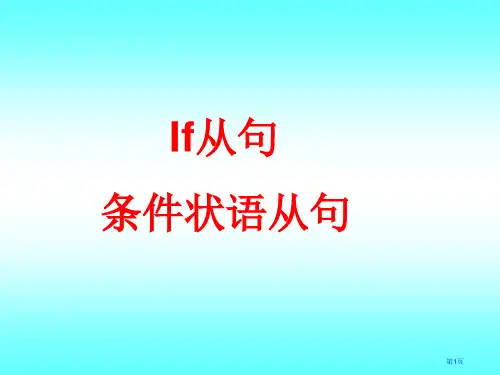
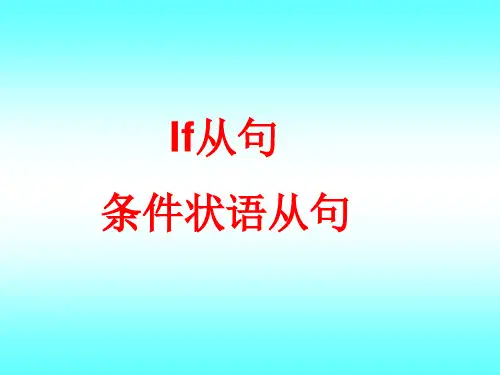
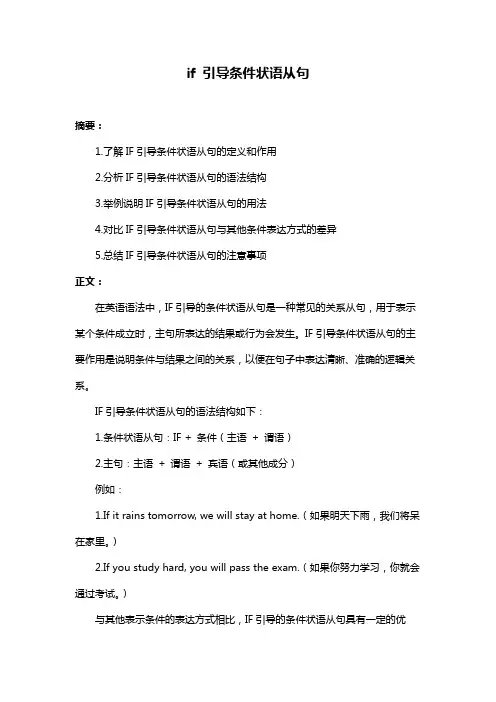
if 引导条件状语从句摘要:1.了解IF引导条件状语从句的定义和作用2.分析IF引导条件状语从句的语法结构3.举例说明IF引导条件状语从句的用法4.对比IF引导条件状语从句与其他条件表达方式的差异5.总结IF引导条件状语从句的注意事项正文:在英语语法中,IF引导的条件状语从句是一种常见的关系从句,用于表示某个条件成立时,主句所表达的结果或行为会发生。
IF引导条件状语从句的主要作用是说明条件与结果之间的关系,以便在句子中表达清晰、准确的逻辑关系。
IF引导条件状语从句的语法结构如下:1.条件状语从句:IF + 条件(主语+ 谓语)2.主句:主语+ 谓语+ 宾语(或其他成分)例如:1.If it rains tomorrow, we will stay at home.(如果明天下雨,我们将呆在家里。
)2.If you study hard, you will pass the exam.(如果你努力学习,你就会通过考试。
)与其他表示条件的表达方式相比,IF引导的条件状语从句具有一定的优势:1.相较于使用“万一”、“如果”等词汇,IF引导的条件状语从句更加简洁、明了。
2.IF引导的条件状语从句可以清晰地呈现条件与结果之间的关系,使句子逻辑更加清晰。
在使用IF引导条件状语从句时,需要注意以下几点:1.条件状语从句中的条件可以是真实的,也可以是假设的。
2.条件状语从句中的条件通常用现在时态表示,但也可以根据需要使用其他时态。
3.主句中的谓语动词通常表示结果或行为,如:be、become、do、go 等。
总之,IF引导条件状语从句是英语中表达条件与结果关系的一种重要手段。
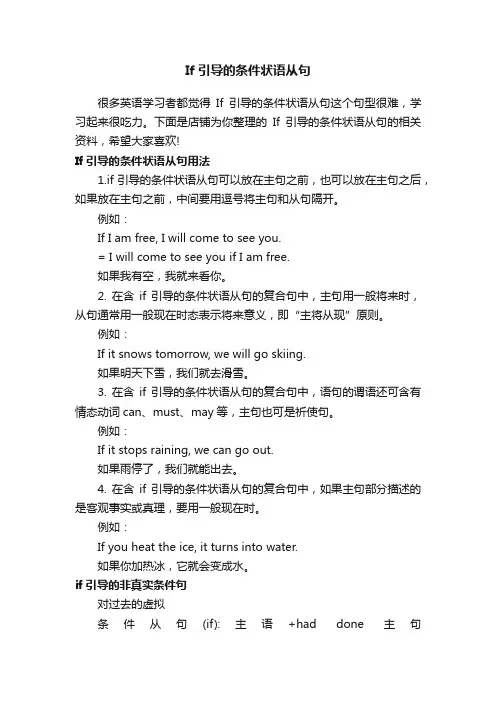
If引导的条件状语从句很多英语学习者都觉得If引导的条件状语从句这个句型很难,学习起来很吃力。
下面是店铺为你整理的If引导的条件状语从句的相关资料,希望大家喜欢!If引导的条件状语从句用法1.if引导的条件状语从句可以放在主句之前,也可以放在主句之后,如果放在主句之前,中间要用逗号将主句和从句隔开。
例如:If I am free, I will come to see you.= I will come to see you if I am free.如果我有空,我就来看你。
2. 在含if引导的条件状语从句的复合句中,主句用一般将来时,从句通常用一般现在时态表示将来意义,即“主将从现”原则。
例如:If it snows tomorrow, we will go skiing.如果明天下雪,我们就去滑雪。
3. 在含if引导的条件状语从句的复合句中,语句的谓语还可含有情态动词can、must、may等,主句也可是祈使句。
例如:If it stops raining, we can go out.如果雨停了,我们就能出去。
4. 在含if引导的条件状语从句的复合句中,如果主句部分描述的是客观事实或真理,要用一般现在时。
例如:If you heat the ice, it turns into water.如果你加热冰,它就会变成水。
if引导的非真实条件句对过去的虚拟条件从句(if):主语+had done 主句might/would/should/could+have done对现在的虚拟if+ 主语+动词过去式(be用were)主句might/would/should/could+do对将来的虚拟if+主语+动词过去式(be用were)或主语+should do或主语+were to do主句 might/would/should/could+doe.g.Tom got to the station in time because he started earlier.If Tom had started late, he would have missed the train.Do you think the thief entered through the door?No, if he had, I don't believe, he would have broken the living room window.If the book weren't so expensive, I would buy it.If you didn't live so far away, we would be able to visit you more.What would you do if you lost your passport in a foreign country?Why hasn't he come? If he should not come on time, we would have to put off the trip.2.注意事项e.g.If she hadn't work hard at English in the past, she wouldn't work as well as a secretary in a large company now. 混合时间的虚拟语气从句为对过去的虚拟,主句是现在。
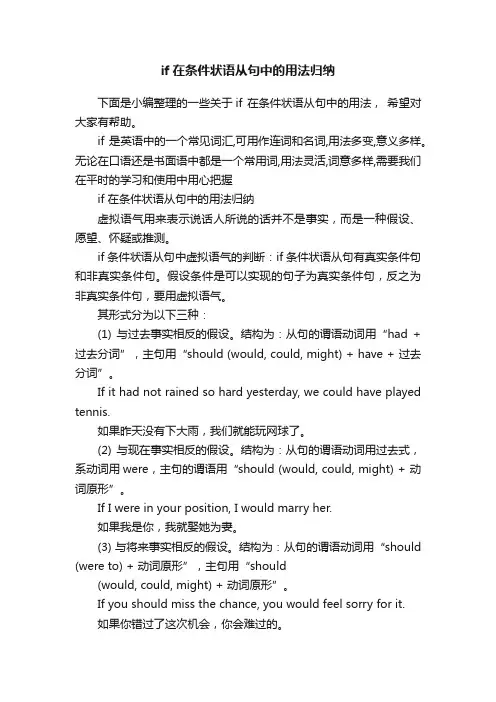
if在条件状语从句中的用法归纳下面是小编整理的一些关于if 在条件状语从句中的用法,希望对大家有帮助。
if是英语中的一个常见词汇,可用作连词和名词,用法多变,意义多样。
无论在口语还是书面语中都是一个常用词,用法灵活,词意多样,需要我们在平时的学习和使用中用心把握if 在条件状语从句中的用法归纳虚拟语气用来表示说话人所说的话并不是事实,而是一种假设、愿望、怀疑或推测。
if 条件状语从句中虚拟语气的判断:if 条件状语从句有真实条件句和非真实条件句。
假设条件是可以实现的句子为真实条件句,反之为非真实条件句,要用虚拟语气。
其形式分为以下三种:(1) 与过去事实相反的假设。
结构为:从句的谓语动词用“had + 过去分词”,主句用“should (would, could, might) + have + 过去分词”。
If it had not rained so hard yesterday, we could have played tennis.如果昨天没有下大雨,我们就能玩网球了。
(2) 与现在事实相反的假设。
结构为:从句的谓语动词用过去式,系动词用were,主句的谓语用“should (would, could, might) + 动词原形”。
If I were in your position, I would marry her.如果我是你,我就娶她为妻。
(3) 与将来事实相反的假设。
结构为:从句的谓语动词用“should (were to) + 动词原形”,主句用“shou ld(would, could, might) + 动词原形”。
If you should miss the chance, you would feel sorry for it.如果你错过了这次机会,你会难过的。
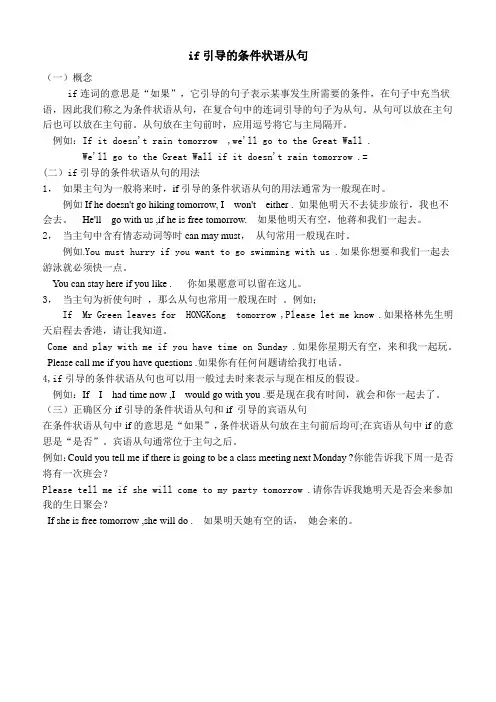
if引导的条件状语从句(一)概念if连词的意思是“如果”,它引导的句子表示某事发生所需要的条件,在句子中充当状语,因此我们称之为条件状语从句,在复合句中的连词引导的句子为从句。
从句可以放在主句后也可以放在主句前。
从句放在主句前时,应用逗号将它与主局隔开。
例如:If it doesn't rain tomorrow ,we'll go to the Great Wall .We'll go to the Great Wall if it doesn't rain tomorrow .=(二)if引导的条件状语从句的用法1,如果主句为一般将来时,if引导的条件状语从句的用法通常为一般现在时。
例如If he doesn't go hiking tomorrow, I won't either . 如果他明天不去徒步旅行,我也不会去。
He'll go with us ,if he is free tomorrow. 如果他明天有空,他蒋和我们一起去。
2,当主句中含有情态动词等时can may must,从句常用一般现在时。
例如.You must hurry if you want to go swimming with us .如果你想要和我们一起去游泳就必须快一点。
You can stay here if you like . 你如果愿意可以留在这儿。
3,当主句为祈使句时,那么从句也常用一般现在时。
例如;If Mr Green leaves for HONGKong tomorrow ,Please let me know .如果格林先生明天启程去香港,请让我知道。
Come and play with me if you have time on Sunday .如果你星期天有空,来和我一起玩。
Please call me if you have questions .如果你有任何问题请给我打电话。
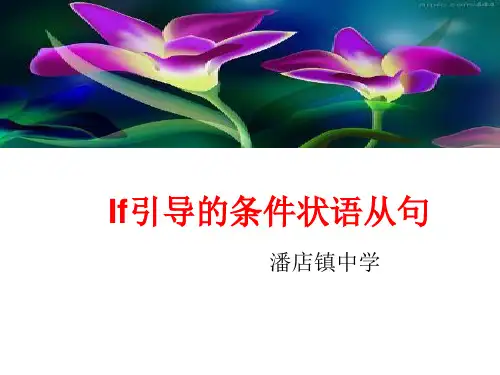
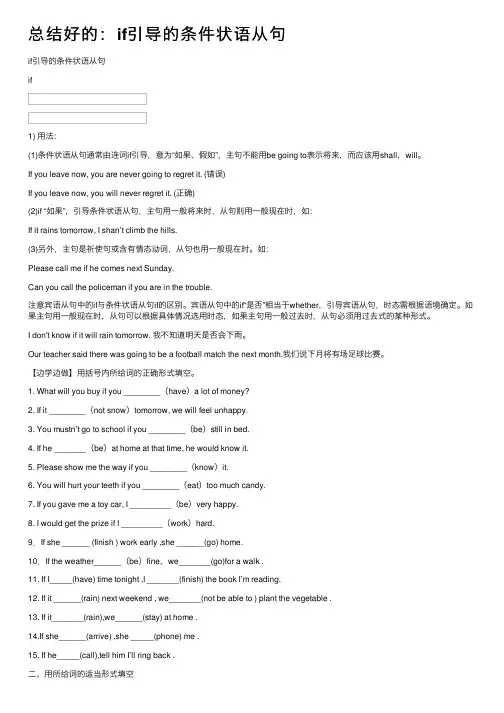
总结好的:if引导的条件状语从句if引导的条件状语从句if1) ⽤法:(1)条件状语从句通常由连词if引导,意为“如果、假如”,主句不能⽤be going to表⽰将来,⽽应该⽤shall,will。
If you leave now, you are never going to regret it. (错误)If you leave now, you will never regret it. (正确)(2)if “如果”,引导条件状语从句,主句⽤⼀般将来时,从句则⽤⼀般现在时,如:If it rains tomorrow, I shan’t climb the hills.(3)另外,主句是祈使句或含有情态动词,从句也⽤⼀般现在时。
如:Please call me if he comes next Sunday.Can you call the policeman if you are in the trouble.注意宾语从句中的if与条件状语从句if的区别。
宾语从句中的if“是否”相当于whether,引导宾语从句,时态需根据语境确定。
如果主句⽤⼀般现在时,从句可以根据具体情况选⽤时态,如果主句⽤⼀般过去时,从句必须⽤过去式的某种形式。
I don't know if it will rain tomorrow. 我不知道明天是否会下⾬。
Our teacher said there was going to be a football match the next month.我们说下⽉将有场⾜球⽐赛。
【边学边做】⽤括号内所给词的正确形式填空。
1. What will you buy if you ________(have)a lot of money?2. If it ________(not snow)tomorrow, we will feel unhappy.3. You mustn’t go to school if you ________(be)still in bed.4. If he _______(be)at home at that time, he would know it.5. Please show me the way if you ________(know)it.6. You will hurt your teeth if you ________(eat)too much candy.7. If you gave me a toy car, I _________(be)very happy.8. I would get the prize if I _________(work)hard.9.If she ______ (finish ) work early ,she ______(go) home.10.If the weather______(be)fine,we_______(go)for a walk .11. If I_____(have) time tonight ,I _______(finish) the book I’m reading.12. If it ______(rain) next weekend , we_______(not be able to ) plant the vegetable .13. If it_______(rain),we______(stay) at home .14.If she______(arrive) ,she _____(phone) me .15. If he_____(call),tell him I’ll ring back .⼆、⽤所给词的适当形式填空1. If you ________(feel) tired, you _________ (have) to have a rest.2. Where _____ he ____(see) the film if he _________(have) time?3. If there ____ (be) fewer trees, there _______ (be) more pollution.4. He ___ (dress) more casually if he ___ (not work) on weekends.5. If Marcia _______ (live) alone, she _______ (keep) a pet parrot.6. Lana _____ (buy) a new dress if the old one ____ (be) out of style.7. The twins _______ (fight) if they__________ (argue).8. I ______ (have) a bake sale if I ____ (need) money for education.9. Peter ____ (send) me a beautiful souvenir if he ____(tour) Spain.10. If Mr. Green _______ (say) I am hard- working, my parents ___ (feel) glad.11. I ______ (go) to the beach if it________ (not rain) this week.12. _____they ___ (have) a match if the P.E. teacher __ (be) busy?13. He ____ (write) a letter to his grandparents if he ____ (get) his report card this week.14. If she ______ (get) up late, she _____ (not catch) the early bus.15. Peter ____ (major) in English if he ____(pass) the exams in Peking University.⼆、完成句⼦1. 他如果看电视太久了,他的⽗母会不⾼兴。
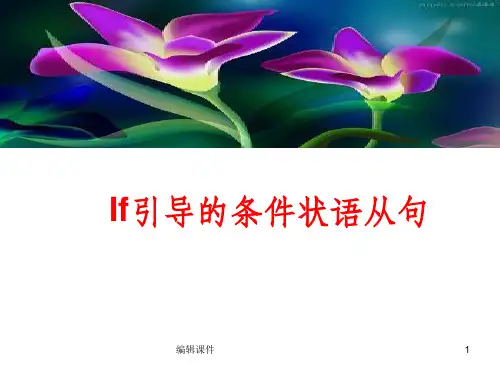
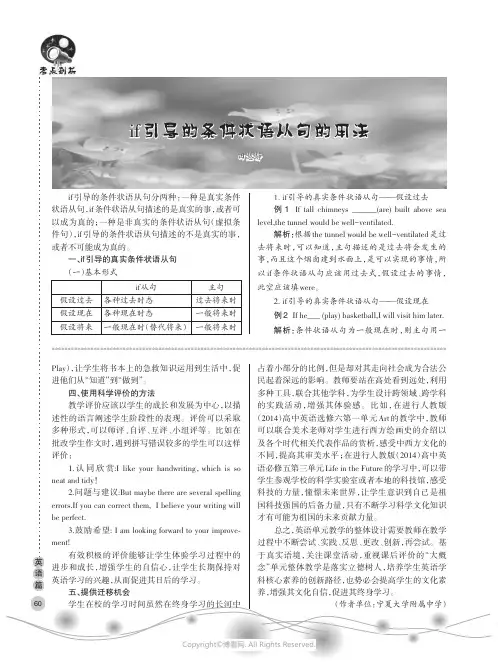
初中基础语法--专题六、if引导的条件状语从句一、if 引导的条件状语从句的用法:1、表示在某种条件下某事很可能发生。
表示假如有从句的动作发生,就会或不会有主句的动作发生。
主句用一般将来时态,从句用一般现在时代替一般将来时,即“主将从现”If we pay much attention to the earth, we will have a better world.If it rains tomorrow, what shall we do?If it doesn’t rain tomorrow, we will go fishing.2、如果if 条件句谈论的是事实,则主从句大多用一般现在时态。
If bears are in danger, they attack people.巧学妙记if 条件句不一般,几个要点记心间;条件句,放在前, 逗号要放句中间。
条件句表可能,主句多用将来时;条件句表事实,主句常用现在时。
二、if 引导的条件状语从句的位置:if 条件句位置灵活,可直接放在主句后面,若if 条件句放句首,从句后面要加逗号,和主句隔开。
We can walk there if we can't find a bus .If it rains tomorrow, we will not go to the zoo.if 条件状语从句的练习一.选择正确的答案填空1.May ( will go/go/goes) to Europe if she (will pass/pass/passes) the exams .2. The graduates (will teach/teach/teaches) in the poor village if the Ministry of Education (will agree/ agree/agrees) soon.3. If there (will be/ are/is) a car accident, they (will call/call/calls) 110 for help at once.4. If it (won’t/don’t/doesn’t/ isn’t) rainy, we (will take/ take/takes) walk outside.5. If a UFO (will land/land/lands) in front of me, I (will go/go/goes) in to look for the alien.6. If he (will have/have/has) money, he (will build/build/builds) a science lab.二、用所给词的适当形式填空1.If you ________(feel) tired, you _______________ (have) to have a rest.2. Where _______ he _________(see) the film if he __________(have) time?3. If there __________(be) fewer trees, there _______________( be) more pollution.4. He __________(dress) more casually if he ___________( not work) on weekends.5. If May _____________(live) alone, she ____________( keep) a pet parrot.6. Lana ____________( buy) a new dress if the old one ___________(be) out of style.三、单项选择1.If you _____ to the party, you’ll have a great time.A. will goB. wentC. goD. going2.--Do you know when she will come back tomorrow?--Sorry, I don’t know. If she ____ back, I’ll tell you.A. comesB. will comeC. comeD. may come3. What will father _____ us from Japan?A. takeB. bringC. carryD. make4.Weifang is famous ______ kites.A. forB. toC. onD. with5.I ____ her the answer if she ____me.A. can tell, will askB. will tell, will askC. would tell, askD. will tell, asks6. --What are you going to do tomorrow?--We’ll go to the library tomorrow if it ___.A. isn’t rainB. rainC. won’t rainD. doesn’t rain7.You can to the station if you can’t find a taxi.A. walksB.walkC.walkesD. will walkif 条件状语从句的综合练习一.选择正确的答案填空1.Don’t wait for me if I (am/ will be) late.2.They (won’t/don’t) go to the beach if it (will rain/rain /rains).3. I (will call/ call) you if he (will stay/stay /stays) at home.4. Mr Smith (will let/ let/lets) you know if he (will need/ need/ needs) help.5. (Will / Do/ Does) he visit the museum if he (won’t / don’t/ doesn’t) get tired?6. Where (will/ do/does) they live if they (will miss/ miss/ misses) the bus?二、用所给词的适当形式填空1.The twins _____________(fight) if they_____________(argue).2.Peter________(major) in English if he ____(pass) the exams in Peking University.3. Peter __________( send) me a beautiful souvenir if he __________(tour) Spain.4. If Mr Green ______(say) I am hard- working, my parents __ _____( feel) glad.5.I _________(go) to the beach if it___________ ( not rain) this week.6. _______they ________(have) a match if the P.E. teacher _________(be) busy?7.He ____(write) a letter to his grandparents if he ____(get) his report card this week.8. If she _______(get) up late, she _____________ ( not catch) the early bus.三、单项选择1. What will you do if you _____ to the old folk’s home visit?A. goB. wentC.goingD. will go2. If I eat ____ food, I’ll be very fat.A. too manyB. many tooC. too muchD. much too3. I’ll give the book to h im if he ___ here next Sunday.A. will comeB. comesC. is comingD. came4. There ____an English film in our school tomorrow.A. is going to haveB. will haveC. is going to beD. has5. I’ll wake you up if he ____back.A. willB. is going to comeC. comesD. come。
一.引导条件状语从句最常用的连词是if,常见的if 条件状语从句表示在某条件下,某事很可能发生,条件是可能存在的,主句中某种情况发生的概率也是很高的。
如:If you ask him,he will help you.如果你请他帮忙,他会帮你的。
If you fail in the exam,you will let him down.如果你考试不及格,你会让他失望的。
If you have finished the homework, you can go home.如果你作业做完了就可以回家了。
二.if 从句还表示不可实现的条件或根本不可能存在的条件,也就是一种虚拟的条件或假设。
从句多用一般过去时或过去完成时,表示对现在或过去的一种假设。
如:If I were you,I would invite him to the party.如果我是你,我会邀请他参加聚会。
I would have arrived much earlier if I had not been caught in the traffic.要不是交通堵塞,我本会来得早一些。
另外你还要注意if 条件句的时态搭配1.if 从句用一般现在时,主句用一般将来时If he runs he’ll get there in time.如果他用跑的,他就会及时赶到那儿。
The cat will scratch you if you pull her tail.如果你拉猫的尾巴,它就会抓你。
2.if 从句用一般现在时,主句用may/might/canIf the fog gets thicker the plane may/might be diverted.如果雾在大一些,飞机可能就会改在别的机场降落。
If it stops snowing we can go out.如果雪停了,我们就可以出去。
3.if 从句用一般现在时,主句用must/shouldIf you want to lose weight you must/should eat less bread.如果你想减肥,你必须少吃面包。